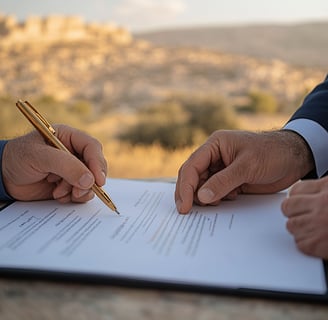Israel and Saudi Arabia on the Verge of Historic Normalization
Israel and Saudi Arabia are reportedly closer than ever to formalizing diplomatic relations, signaling a historic shift in Middle Eastern geopolitics. Israel's ambassador to the U.S., Yechiel Leiter, highlighted the decline of extremist groups like Hamas and Hezbollah as a key factor in this progress. Saudi Arabia, aligning with Israel’s security concerns, is also pushing for tangible benefits for Palestinians as part of any agreement. If finalized, this deal could reshape regional alliances, boost economic cooperation, and promote stability, marking a new era of diplomatic engagement in the Middle East. Leiter attributes this progress to recent strategic shifts in the region, particularly the weakening of groups like Hamas and Hezbollah. He noted that Saudi Arabia shares Israel's interest in diminishing the influence of such organizations, viewing their decline as essential to the kingdom's modernization efforts. Reflecting on the broader implications, Leiter highlighted the rapid evolution of Israel's regional standing. He pointed out that discussions of this nature would have been unimaginable three decades ago. The ambassador also acknowledged the importance of addressing Palestinian concerns, noting that Saudi Arabia seeks tangible benefits for Palestinians in any forthcoming agreement. This potential agreement is seen as part of a larger strategy to reshape the Middle East, fostering cooperation and rejecting extremism. While challenges remain, the momentum towards normalization between Israel and Saudi Arabia marks a pivotal moment in regional diplomacy.
2/1/20251 min read


Israel and Saudi Arabia Nearing Historic Normalization Agreement
January 28, 2025
In a significant development, Israel and Saudi Arabia are reportedly closer than ever to establishing formal diplomatic relations. Israel's newly appointed ambassador to the United States, Yechiel Leiter, emphasized that this potential normalization could be transformative for the Middle East and beyond.
Leiter attributes this progress to recent strategic shifts in the region, particularly the weakening of groups like Hamas and Hezbollah. He noted that Saudi Arabia shares Israel's interest in diminishing the influence of such organizations, viewing their decline as essential to the kingdom's modernization efforts.
Reflecting on the broader implications, Leiter highlighted the rapid evolution of Israel's regional standing. He pointed out that discussions of this nature would have been unimaginable three decades ago. The ambassador also acknowledged the importance of addressing Palestinian concerns, noting that Saudi Arabia seeks tangible benefits for Palestinians in any forthcoming agreement.
This potential agreement is seen as part of a larger strategy to reshape the Middle East, fostering cooperation and rejecting extremism. While challenges remain, the momentum towards normalization between Israel and Saudi Arabia marks a pivotal moment in regional diplomacy.